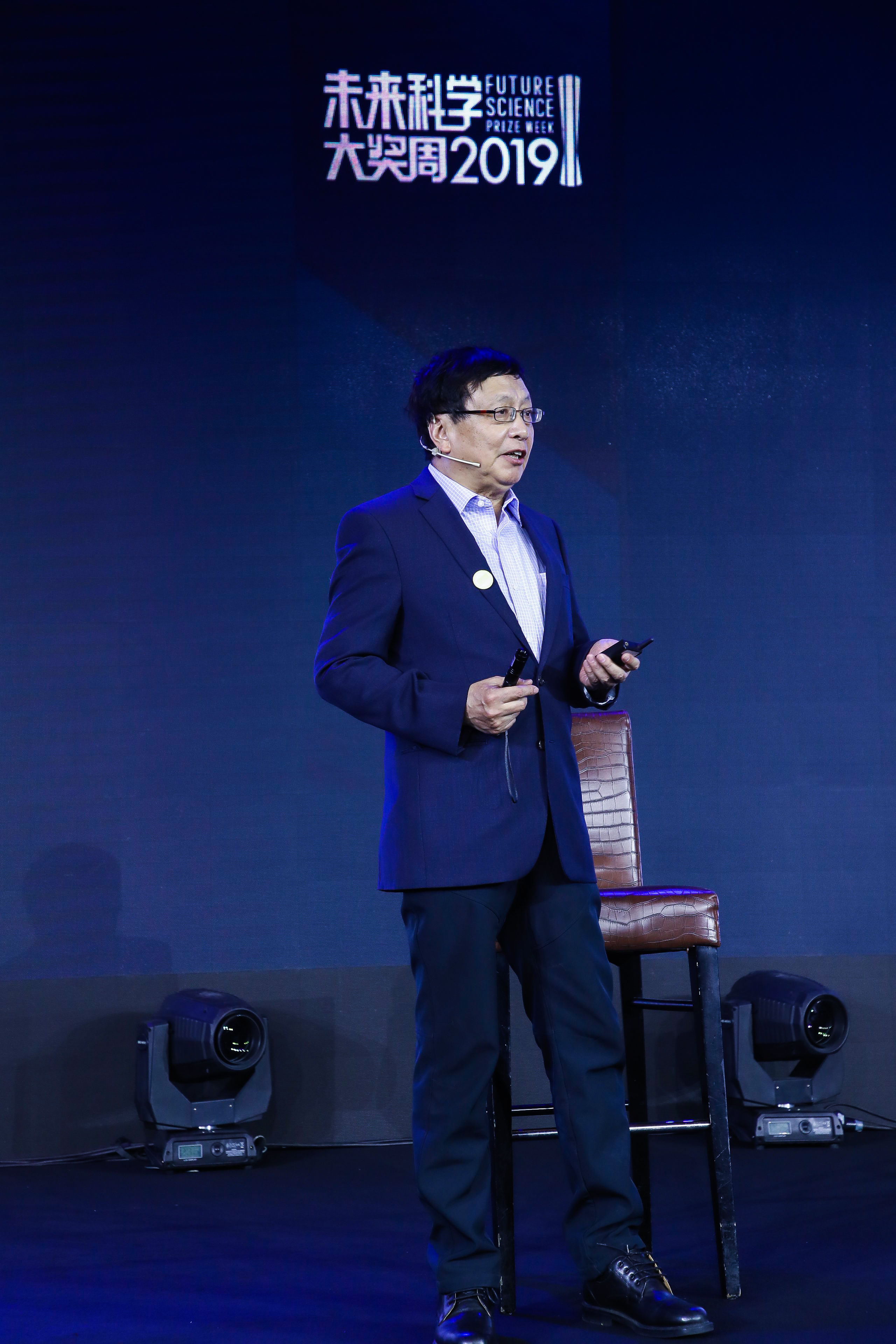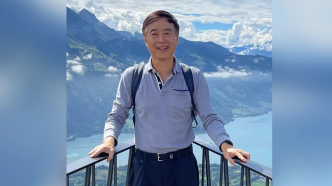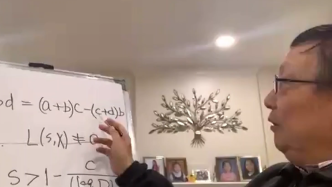
The news that Chinese-American mathematician and professor of mathematics at the University of California, Santa Barbara, Zhang Yitang, claimed to have solved the Landau-Siegel zero-point conjecture, which aroused the attention of the mathematics community.
On October 17, The Paper (www.thepaper.cn) learned that Zhang Yitang disclosed relevant news in advance at the "Communication with Mathematician Zhang Yitang" event of the Peking University Greater New York Alumni Association, and the relevant papers have not been officially published.
'It feels like one person has been struck twice by lightning'
"Professor Zhang Yitang mentioned in the meeting and the official sharing that he has completed the work related to the Landau-Siegel zeros conjecture and will publish a paper. It can be seen that he is very happy. Said that the paper will first be uploaded to the preprint website and then published in the journal. Everyone also asked him what issues will he focus on next? Professor Zhang said that it will be kept secret for the time being.” The physics major of Peking University who participated in the event in New York, USA Zhao Zhishen, an undergraduate graduate and Ph.D. in high-energy theoretical physics from the University of Michigan, Ann Arbor, told The Paper on October 17.
In response to this news, some commented, "If Zhang proves the existence of Siegel's zero point, then the Riemann conjecture can die. Zhang (Yi Tang) is directly one of the greatest mathematicians in the past 50 years." "But that would be too appalling, so I guess Zhang should be proving that the Landau-Siegel zero doesn't exist. This is also a more convincing conclusion."
According to people close to Zhang Yitang, Professor Zhang Yitang just revealed a little bit at the event in New York, and he did not expect to attract so many people's attention. "After October 20, the text of the paper will be published online."
Zhao Zhishen told The Paper that Professor Zhang Yitang did not reveal much at the event, but said that he had solved the Landau-Siegel zeros conjecture and would publish (the paper) in the next few weeks. "Professor Zhang Yitang is very confident in the correctness of this work, and expressed his great pleasure to be the first to announce this news at the activities of the Peking University Alumni Association. Now he should be very busy and processing papers."
According to Zhao Zhishen, the tenth "Unnamed Inheritance Series Activities" of the Peking University Greater New York Alumni Association invited Professor Zhang Yitang to exchange views with the theme of "My Mathematical History". The event was held at 8 pm ET on October 14th. It will be held at 8:00 a.m. on October 15, Beijing time. In addition to the more than 20 participants on the spot, two or three hundred people on the Internet participated in the event through Zoom software.
A draft of the lecture notes about the above-mentioned activities circulated on the Internet recorded some of the content shared by Zhang Yitang.
The record shows that Zhang Yitang said, "I have a new victory", which is about the Landau-Siegel zero-point conjecture in analytic number theory, and said that "this problem has existed for 200 years, and it is more important than the twin prime number conjecture."
The record shows that Zhang Yitang said, "I have tried many (possible zero point) situations, but there is always one ε, like "the sea holds a needle", and I found out the bottom of the sea, so I realized that this needle is not necessary! This feeling , that is, one person was struck by lightning twice!"
Ye Yurui, co-secretary of the Metaverse Industry Committee of China Mobile Communications Federation, who participated in the event online, confirmed to The Paper that the content of the note was "true". He said that Zhang Yitang shared in Chinese, and the questions raised by everyone were rather broad, not just number theory.
According to the draft of the lecture notes, Zhang Yitang once again mentioned the Landau-Siegel conjecture in the interactive session and called it "a bottleneck in number theory". To analyze this problem, "have a broad vision".
Cai Tianxin, a professor, doctoral tutor, and Qiushi Distinguished Scholar at the School of Mathematical Sciences of Zhejiang University, told The Paper that the Lang Dao-Siegel zero-point conjecture can be said to be a problem related to the generalized Riemann function or conjecture.
The so-called Landau-Siegel zero point conjecture is simply a weak form of the Riemann conjecture. The core question to be answered is whether there is a thing called the Landau-Siegel zero point. According to the "qubit" article, the anomaly zero is often referred to as Landau due to the pioneering work done by two mathematicians, Landau (Landau) and Siegel (Siegel) in the field of L-function anomalous zeros. -Siegel zeros; and the conjecture that asserts that the L function has no anomalous zeros is called the Landau-Siegel conjecture.
Fifteen years ago, on May 29, 2007, Zhang Yitang submitted a paper titled "On the Landau-Siegel Zeros Conjecture" on the preprint website arxiv.
The paper consists of 13 sections and 54 pages. According to the paper, "We provide a proof of a variant of the Landau-Siegel zero-point conjecture." According to an article published by the Xinzhiyuan WeChat public account, someone later said, "There is a bug in the argument. Tang has been hoping it can be fixed, and in 2019 he said there had been some welcome progress on that conjecture."
On November 16, 2019, Zhang Yitang gave a speech entitled "The Landau-Siegel Zero Point Problem in Number Theory" at the "Future Science Prize Week 2019" in Beijing. Zhang Yitang said in his speech, "It can now be proved that if such a zero exists, it has at most one. If it exists, it is called a Landau-Siegel zero. Because it was the first two famous mathematicians Start to study this zero. If this zero really exists, then the generalized Riemann hypothesis is wrong. So, in fact, the Landau-Siegel zero problem is to prove that such a zero does not exist." "We To study this zero point problem, we hope to be able to prove that it does not exist." "We dream of trying to prove that it does not exist!"
He said that some mathematicians say, "The Landau-Siegel zero is a bottleneck in number theory. If it is solved, it will lead to a chain of inferences, whether in analytic or algebraic number theory, it It will have a big impact, it can be said to be a revolution.”
Zhang Yitang said that since the beginning of the 20th century, many experts in number theory have tried to solve this problem, but have not been successful. Some mathematicians even predicted, "The solution of the Landau-Siegel zero point problem may be more difficult than the original Riemann zeta function and the original Riemann zeta conjecture. In many research areas, because we do not know the existence of this zero point It doesn't exist, so number theorists have to discuss two situations: If it exists, what conclusion will be drawn? If it does not exist, what conclusion will be drawn?"
Zhang Yitang said, "If this zero point really exists, it's incredible! The generalized Riemann hypothesis is wrong, so what will happen in the universe? We will get a lot of inferences, and they are very strong inferences, and even a little too strong. ."
At the end of the report at the time, Zhang Yitang said, "If a Landau-Siegel zero point is established, an inequality can be drawn in the end. And this inequality is obviously wrong, so a contradiction can be deduced from here. From this perspective speaking, we get a contradiction from the existence of the Landau-Siegel zero. For now, all I can report is that at least a weak form like this problem is still possible to make, but the whole technical ( technically) things are very complex."

On November 16, 2019, Zhang Yitang gave a speech entitled "The Landau-Siegel Zero Point Problem in Number Theory" at the "Future Science Prize Week 2019" in Beijing.
The tenth "Unnamed Inheritance Series Activities" of the Peking University Greater New York Alumni Association said in the announcement of the event, "Mr. Zhang Yitang will talk about the interesting events on the campus of Peking University and the teaching experience of Peking University in recent years." He also said, "The road to scientific research is bumpy. But he never gave up the pursuit of his dreams. At the age of 58, he became a recognized number theorist with this proof. His rough and legendary mathematical journey has caused repercussions both inside and outside the academic circle." According to the organizer of the above event, Zhang Yitang, Chinese-American Mathematician, professor of mathematics at the University of California, Santa Barbara, admitted to the mathematics department of Peking University in 1978, received undergraduate and postgraduate education, and has outstanding achievements in the field of analytic number theory. Zhang Yitang published "Bounded Intervals between Prime Numbers" in Annals of Mathematics on April 17, 2013, and proved for the first time that there are infinitely many pairs of prime numbers (p, q), where the difference between each pair of prime numbers , that is, the distance between p and q is not more than 70 million, thus achieving a qualitative breakthrough in the number theory problem of the twin prime number conjecture.
In addition, the transcript of the online lecture notes shows that Zhang Yitang said, "Eight years ago, after someone improved my (previous) result, I was not convinced and must do it to the extreme." "If you don't believe me, I can't do it (better). results)!"
According to reports, about half a year after Zhang Yitang achieved the "bounded interval between prime numbers", 26-year-old James Maynard also came up with his research results: he proposed a completely independent solution. , reducing the number of 70 million to 600, optimizing the proof result of Zhang Yitang.
It is worth mentioning that on September 23, 2022, the winners of the "2023 Scientific Breakthrough Award" were announced, and James Maynard and two other scientists won the "2023 New Horizons Award in Mathematics".
half-life legendary mathematician
Zhang Yitang was born in Shanghai in February 1955, and his ancestral home is Pinghu, Zhejiang. Due to his rough life experience and outstanding mathematical achievements, Zhang Yitang is known as a legendary mathematician. He went to study abroad at the age of 30, but was nearly 60 when he published an important paper.
In an article about Zhang Yitang, the Peking University Alumni Network described him as a legendary mathematician who was "down and down half his life".
Tang Tao, an academician of the Chinese Academy of Sciences, wrote in the article "Zhang Yitang: A Lonely Mathematician" that Zhang Yitang was not surprised by the humiliation. Helping out at a Subway restaurant owned by a friend, he can be meticulous. Teaching at a university, at the age of 60, he is still just a lecturer. In the eyes of ordinary people, he is undoubtedly a failure, or even down and out, but he is calm and does not change his ambition.
According to Peking University News, Zhang Yitang is a 1978 alumnus of the Department of Mathematics of Peking University. From 1982 to 1985, he studied under the famous number theory expert Pan Chengbiao and studied for a master's degree. After obtaining a bachelor's and a master's degree in mathematics from Peking University, he went to Purdue University to read a doctorate in 1985, and then taught at the University of New Hampshire. In 2013, his breakthrough work for the solution of the century problem "twin prime number conjecture" proved that there are infinitely many prime number pairs with a difference of less than 70 million, from an obscure university lecturer to a world heavyweight mathematician. ranks. Henry Ivanick, a reviewer for the top journal in the field of mathematics, Mathematical Yearbook, called it "historically groundbreaking work" and "a beautiful article." The twin prime conjecture, like Goldbach's conjecture, has fascinated countless number theorists, and they have spent their lives trying to find a proof for it.
Zhang Yitang recalled the past in Yanyuan and said that during his studies at Peking University, he laid a very solid foundation in number theory, and he received careful guidance and rigorous academic training during the three years he studied for a master's degree under his tutor Pan Chengbiao. The seal of President Ding Shisun on his graduation certificate. And Pan Chengbiao said that when he was studying, "elementary number theory" was taught by Ding Shisun.
At the New York sharing meeting of Peking University alumni held on October 14, 2022, local time, Zhang Yitang also mentioned his mentor Pan Chengbiao. He said, "Before I went to graduate school, Mr. Pan Chengbiao asked me to read a doctoral dissertation. When we met in a few days, the first sentence he asked me was: Is there any error in the content? I said it was wrong, and then explained it in detail. Said: You are serious! Then I followed him to graduate school."
The above-mentioned article on the Peking University Alumni Network stated that, from studying abroad at the age of 30 to making world-shattering achievements at the age of 60, Zhang Yitang experienced academic setbacks, failed job hunting, and did various chores during the 30 years in between.
Among them, in the following 14 years, although he got a job teaching in the school, he has always been a lecturer without a formal establishment, but he has never changed his ambition.
In 1985, Zhang Yitang came to Purdue University, a prestigious university in the United States, to study for a Ph.D., and encountered all kinds of setbacks. The research topic of Dr. Zhang Yitang was the Jacobi conjecture. On the eve of his Ph.D. graduation, he claimed to have solved the Jacobi conjecture. Unfortunately, a lemma in his proof was the result of an article published by his mentor Mo Zongjian. The previous results were wrong. Zhang Yitang, who has a very high vision, disdains to sort out the results of this flawed doctoral dissertation and publish it. To make matters worse, he didn't have a good relationship with his mentor.
Because the results of his doctoral dissertation were not published, and his supervisor was unwilling to write a letter of recommendation, Zhang Yitang could not even find a postdoctoral job after graduation.
In the six or seven years after graduation, he worked a lot of chores, including working as a temporary accountant at Subway, a restaurant helper, and delivering food.
In 1999, with the help of a friend from the Department of Mathematics at Peking University, Zhang Yitang found a teaching assistant position at the University of New Hampshire. After 2005, he became a full-time lecturer and became a relatively stable lecturer. The salaries of professors and associate professors in research series are much lower, and there is no research funding.
But 14 years at the University of New Hampshire was a golden period for Zhang Yitang's research. On July 3, 2012, on a sunny afternoon, Zhang Yitang smoked in the backyard of his friend Ziyage's house in Colorado. For more than 20 minutes, he came up with the main idea like a divine revelation, and found a special breakthrough that no one else had thought of. .
Zhang Yitang said, "My habit is to consider two or three relatively serious and difficult mathematical problems at the same time, but there is no clear goal that I want to specialize in a certain problem." "I didn't choose it because it was a peak. I I just knew it was a problem, and I kept thinking about it, and I kept thinking until the second half of last year, when I knew I could make it and break through the barriers to proof, and only then did I focus entirely on this problem.”
On April 17, 2013, a number theory paper by Zhang Yitang was submitted to the "Annual Mathematics", the most famous publication in the field of pure mathematics. Commented by today's top analytic number theory expert Henry Ivanic: This is an important work with a historic breakthrough, and the article is very beautiful. Thanks to his ice-breaking work on the twin prime conjecture, one of the most famous conjectures in mathematics, Zhang Yitang rose from an obscure university lecturer to the ranks of the world's heavyweight mathematicians.
On May 22, 2013, the British "Guardian" published an article with the headline: Little-known professor has taken a big step forward on the big problem that has plagued the mathematics elite for centuries. Mainstream Indian newspapers compared the man who made this extraordinary contribution to Ramanujan, the greatest genius mathematician in Indian history.
A reporter asked Zhang Yitang how much time did he spend doing academic work every day? He said, "Researching mathematics does not mean you have to sit at a desk. I don't have much time like this. I spend most of my time thinking about mathematics while walking. I don't drive because I can't think about mathematics when driving. If you count thinking I think at least 10 hours a day, usually 12 or 14 hours a day. I like to go to a coffee shop alone in the morning, have a cup of coffee, and think about math. Morning is a very easy time for inspiration.”
On December 2, 2013, the American Mathematical Society announced that the 2014 Frank Nelson Cole Prize in Number Theory will be awarded to Yitang Zhang.
On February 13, 2014, Zhang Yitang was awarded the Rolf Schock Prize in mathematics jointly established by the Royal Swedish Academy of Sciences, the Royal Swedish Academy of Music, and the Royal Swedish Academy of Arts.
On September 16, 2014, Zhang Yitang received the MacArthur Genius Award.
On October 14, 2022, New York, Peking University Greater New York Area Alumni Association Exchange Symposium, Zhang Yitang said when answering the question "Does (mathematical research) require extraordinary talent?" needs to be motivated."
(The Paper reporter Chen Zhuqin also contributed to this article)


